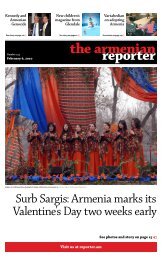National, International, Armenia, and Community News and Opinion
National, International, Armenia, and Community News and Opinion
National, International, Armenia, and Community News and Opinion
- No tags were found...
You also want an ePaper? Increase the reach of your titles
YUMPU automatically turns print PDFs into web optimized ePapers that Google loves.
The <strong>Armenia</strong>n Reporter | November 8, 2008<strong>International</strong>The Maiendorf Declaration: reactions from<strong>Armenia</strong>, Nagorno-Karabakh, <strong>and</strong> Azerbaijanby Tatul HakobyanYEREVAN – The three co-chairs ofthe OSCE Minsk Group on November6 met in Vienna to discuss Russia’smediation effort in the Karabakhpeace process <strong>and</strong> the resultsof the meeting of the presidents of<strong>Armenia</strong>, Azerbaijan, <strong>and</strong> Russiain Moscow. Matthew Bryza, theAmerican co-chair, announced thatthe Moscow Declaration made itclear that henceforth negotiationswill continue based on the MadridPrinciples. “The issue of whetherthe Madrid Principles was on theagenda or not has been resolvedwith this declaration. All the effortsgeared toward resolving thisconflict from now on will be basedupon the those founding principles,”Mr. Bryza said.Yuri Merzlyakov of the RussianFederation, Bernard Fassierof France, Deputy Assistant Secretaryof State Bryza, <strong>and</strong> AndrzejKasprzyk, the Personal Representativeof the OSCE Chairman-in-Office on the Nagorno-Karabakhconflict, talked to journalists aftertheir address to the OSCE PermanentCouncil. “There are personalfactors <strong>and</strong> objective factors in theregion that give us co-chairs a reasonfor some cautious optimism orrealistic optimism,” said Mr. Bryza.“Among the personal factors,the November 2 Moscow meetingconfirmed the constructivespirit of their first St Petersburgmeeting last June. This constructivespirit allowed them to signthe first-ever declaration on theNagorno-Karabakh peace process,”Mr. Fassier said. He cited discussionsbetween Ankara <strong>and</strong> Yerevanamong the positive factors.Among the “objective factors,”was the crisis in Georgia. The cochairssaid that <strong>Armenia</strong> felt thefragile character of their lines ofcommunication for imports <strong>and</strong> exportsthrough Georgia. Azerbaijanfelt deeply the vulnerability of theso-called energy corridor throughGeorgia.“The Moscow meeting, thoughprepared long in advance in a bilateralway, Russia-<strong>Armenia</strong>, Russia-Azerbaijan,nevertheless is inthe framework in the Minsk Groupco-chair countries’ efforts of mediation,”said Mr. Merzlyakov.Mr. Kasprzyk noted that an estimated25 people died this yearon the front lines of the Nagorno-Karabakh conflict <strong>and</strong> highlightedthat such incidents were detrimentalto the peace process.The Minsk Group co-chairs planto visit the region in the weeks priorto the OSCE Ministerial Council,scheduled in Helsinki on December4–5, to work with the partiesto build on the recently establishedmomentum <strong>and</strong> to try to find amutually acceptable solution to thelast remaining differences betweenthem.Does Karabakh get asay in its fate?The tripartite declaration, signedby the presidents of <strong>Armenia</strong> <strong>and</strong>Azerbaijan on November 2 at MeiendorfCastle near Moscow, mediatedby the president of Russia, isthe first document following the1994 ceasefire agreement to bearthe signatures of the presidents ofthe two countries involved in theKarabakh conflict.But the document is also the firstsince 1994 that does not bear thesignature of the main party to theconflict – Nagorno-Karabakh. InFrom left, Presidents Aliyev, Medvedev, <strong>and</strong> Sargsian on Nov. 2. Photo: Photolure.1994, Vladimir Kazimirov, whowas the Russian mediator <strong>and</strong> themain proponent of stopping thebloodshed in Karabakh, at thattime attached great importance toStepanakert’s involvement <strong>and</strong> signatureon all documents. The Bishkekprotocol <strong>and</strong> Moscow’s agreementthat were signed that year hadthe signatures of Karen Baburyan,the speaker of Nagorno-Karabakh’sparliament <strong>and</strong> Samvel Babayan,the minister of defense.The reactions to the Meiendorfdeclaration are different in Yerevan,Stepanakert, <strong>and</strong> Baku. ForeignMinister Edward Nalb<strong>and</strong>ianassesses the Dmitri Medvedev- Serge Sargsian - Ilham Aliyevmeeting as successful <strong>and</strong> productive,since “the signing of the declarationwill assist the future processof the negotiations <strong>and</strong> the politicalresolution of the Karabakh conflict,within the framework of the MinskGroup <strong>and</strong> the Madrid principals.”The opposition is worried. In aninterview with A1+, Levon Ter-Petrossian, the first president of<strong>Armenia</strong>, said, “That document issimply the tip of the iceberg. Other,more detailed documents lie beneathit.” Mr. Ter-Petrossian is concernedbecause the Madrid proposalstipulates that the harmonizationof the two principles of territorialintegrity <strong>and</strong> the self-determinationof nations will be the basis forthe Karabakh settlement. Duringhis last public appearance at a politicalrally, Mr. Ter-Petrossian saidthat according to the Madrid principles,“<strong>Armenia</strong> would be forced toreturn most of the liberated territoriesoutside of Nagorno-Karabakh,except for the Lachin corridor, toAzerbaijan.”The Moscow Declaration “speaksof the necessity of resolving theKarabakh issue through the directdialogue underway between Azerbaijan<strong>and</strong> <strong>Armenia</strong>. De facto, anew formula is being set for theconflicting sides. This declarationburies the decision adopted atthe OSCE 1994 Budapest summit,where NKR was recognized as thethird legitimate side in the conflict.This means that NKR will not havea role in the negotiation processesthat will determine its fate,” saidMr. Ter-Petrossian.The first president underscoredthat with Mr. Sargsian’s <strong>and</strong> Mr.Aliyev’s signatures under the Meiendorfdeclaration, “the final stageof the settlement of the Karabakhconflict has been announced.”On October 25, in an interviewwith <strong>Armenia</strong>’s Public TV, Mr. Sargsianconfirmed that the resolutionof the Karabakh conflict hasentered a new active stage. “Thesettlement of the Karabakh issueis possible if Azerbaijan recognizesthe right for self-determinationof the people of NKR; if NKR has al<strong>and</strong> border with <strong>Armenia</strong>, <strong>and</strong> internationalorganizations <strong>and</strong> leadingcountries guarantee the safetyof the people of Karabakh,” saidMr. Sargsian.Stepanakert is notsatisfiedGeorgi Petrossian, the foreignminister of Nagorno-Karabakh,said that the meeting at Meiendorfwas an attempt to clarify therespective positions of <strong>Armenia</strong><strong>and</strong> Azerbaijan through politicalmeans, taking into considerationthe changes in the region after theevents of August.Mr. Petrossian believes that inorder for the resolution process tomove forward, NKR, which has fulfilledall international obligations,must be a full partner in the negotiations.“If Azerbaijan was trulyinterested in the resolution of theconflict, then they would have satdown at the negotiating table withNKR a long time ago, instead of applyingto different internationalbodies to apply pressure on NKR<strong>and</strong> to cloud international publicopinion,” Mr. Petrossian said.Political analyst Davit Babayan,head of the information office ofthe president of Nagorno-Karabakhsaid during an interview withthe <strong>Armenia</strong>n Reporter that in thedeclaration, “there is no mention ofNagorno-Karabakh nor the Karabakhside.“Isn’t that an attempt to shift theKarabakh conflict to the level of aterritorial argument between <strong>Armenia</strong><strong>and</strong> Azerbaijan? Such an inclinationis present, but, nevertheless,not decisive. First of all ‘<strong>Armenia</strong>n-Azerbaijaniconflict’ or ‘Conflicton Nagorno-Karabakh’ is notmentioned in any of the points inthe declaration, which not only defacto, but also from the legal aspectwould mean a territorial dispute.Secondly, from the declaration’stext it is evident that Stepanakert’sparticipation is expected,” said Mr.Babayan.Gegham Baghdasarian, an independentmember of the Nagorno-Karabakh parliament, thinks thatthe true evaluation of the documentwill be the steps taken arisingfrom it.“In order to give a complete evaluationof the document, it is necessaryto be aware of all the information.In other words, apart from beingaware of the text, one must alsobe aware of the behind-the-doordiscussions in Moscow <strong>and</strong> the oralagreements. Since we do not possessthe relevant information, thenour analyses <strong>and</strong> evaluations aregoing to concern the visible part ofthe iceberg: the text of the declaration.As far as the main wordingis concerned, then it is not verycertain what the president had inmind when agreeing that peace settlementshould be accompanied bylegally binding guarantees for everyaspect <strong>and</strong> stage of the settlementprocess,” Mr. Baghdasariantold the <strong>Armenia</strong> Reporter.Vahram Atanesian, chair ofthe Permanent Committee on ForeignAffairs of the parliament ofNagorno-Karabakh noted that allsuch documents can be interpretedin many ways <strong>and</strong> the Moscow declarationwill not be an exception.“A new name, Moscow Declaration,is being put into circulation.The difference is that in the pastwe were talking about verbal agreements,but today we are dealingwith a signed document. As I see it,Nagorno-Karabakh’s willingness tojoin in or not in the declaration <strong>and</strong>to take on the responsibility or notis going to be fundamental. It seemsthat in the near future the mediatorsare going to concentrate theirefforts to carry out so called ‘explanatorywork’ in Nagorno-Karabakh.They can outline at least some factorsafter those contacts, but meanwhilethe mediators should not overestimate <strong>Armenia</strong>’s influence onNKR,” said Atanesian.Armen Sarkissian, the only ARFmember of Nagorno-Karabakh’sparliament, characterized negotiationswithout Karabakh’s participationas “absurd.”“The Madrid Principles are unacceptablefor Nagorno-Karabakh,as Nagorno-Karabakh’s self-determinationis brought under question.De facto, an attempt is beingmade to accept the principles <strong>and</strong>force them on Karabakh. Withoutthe participation of Karabakh, thenegotiations are condemned tofailure,” Mr. Sarkissian said to the<strong>Armenia</strong>n Reporter.Full text of the declarationThe declaration, adopted by thepresidents of Azerbaijan, <strong>Armenia</strong>,<strong>and</strong> Russia at Meiendorf castle nearMoscow on November 2, was publiclyread out by Russia’s PresidentDmitry Medvedev. This <strong>Armenia</strong>nReporter translation is based on thetranscript circulated by the Regnumnews agency.The presidents of the AzerbaijaniRepublic, the Republic of <strong>Armenia</strong>,<strong>and</strong> the Russian Federation, havingmet in Moscow on November2, 2008, on the invitation of thepresident of the Russian Federation,<strong>and</strong> having discussed in aconstructive atmosphere directly<strong>and</strong> in detail the status <strong>and</strong> prospectsof the settlement of the Nagorno-Karabakhconflict by politicalmeans, through direct dialoguebetween Azerbaijan <strong>and</strong> <strong>Armenia</strong>with mediation by Russia, theUnited States, <strong>and</strong> France as cochairsof the OSCE Minsk Group,1. Declare that they shall contributeto the establishment of ahealthier situation in the SouthCaucasus <strong>and</strong> securing regionalstability <strong>and</strong> security througha political settlement of the Nagorno-Karabakhconflict on thebasis of principles <strong>and</strong> norms ofinternational law <strong>and</strong> solutionsThe oppositionin Azerbaijan isdissatisfiedChief of the international relationsdepartment of the Azerbaijan’spresident’s office Novruz Mammadovdescribed the Moscow Declarationas “very important” <strong>and</strong>“the beginning of a new phase in the14-year-long, complicated <strong>and</strong> difficultprocess of negotiations. I thinkthe process should be accelerated becauseof Russia’s active involvementin the process <strong>and</strong> the documentsigned directly by the presidents,”he told APA Azeri news agency.Member of the Political Councilof the ruling New Azerbaijan PartyAydin Mirzazade stated that theactivation of Russia in the settlementof the Nagorno-Karabakhconflict will accelerate its solution.“Signing of declaration means acceptanceof juridical obligations, whichis a positive milestone,” he said.The opposition in Azerbaijan, is,however, first of all dissatisfied <strong>and</strong>concerned that the declaration hasbeen signed at Russia’s initiative.Independent political scientistVafa Guluzade (advisor to previouspresidents Mutalibov, Elchibey,<strong>and</strong> Aliyev Senior; he conductedthe Karabakh negotiations in the90s) said “the document is profitableonly for <strong>Armenia</strong> <strong>and</strong> Russia. Ifpreviously <strong>Armenia</strong> suspected thatAzerbaijan could attack, now theyhave the document <strong>and</strong> can sleepquietly.”The Musavat Party (the party’sleader Isa Gambar was the actingpresident of Azerbaijan for ashort period of time in 1992) issueda statement which said thatthe joint declaration <strong>and</strong> its pointsabout the Madrid proposals placeAzerbaijan in an unacceptable positionabout the future status ofNagorno-Karabakh. “Solving theNagorno-Karabakh problem on thebasis of the Madrid proposals putthe issues of Azerbaijan’s territorialintegrity <strong>and</strong> sovereignty underserious question.”The Azerbaijan Democratic Partyvalued the Moscow talks <strong>and</strong>Russia’s attempt to take the initiativeunilaterally as revenge for theMinsk Group members’ intentionsto dismiss Moscow for its actionsagainst Georgia. The party arguedthat the 2007 Madrid principles arecontrary to international law <strong>and</strong>solution of the problem on the basisof these principles has no prospects<strong>and</strong> doesn’t guarantee longtermpeace in the region. f<strong>and</strong> documents adopted in theirframes, that would create favorableconditions for economic development<strong>and</strong> all-encompassingcooperation in the region;2. Confirm the importance ofcontinued efforts by the OSCEMinsk Group co-chairs, with considerationof their meeting withthe sides in Madrid on November29, 2007, <strong>and</strong> subsequent discussionsaiming at the developmentof basic principles of a politicalsettlement in the future;3. Agree that the achievementof a peaceful settlement must beaccompanied by legally bindinginternational guarantees of all ofits aspects <strong>and</strong> stages.4. Note that the presidents ofAzerbaijan <strong>and</strong> <strong>Armenia</strong> agreedto continue to work on the developmentof a political settlementof the Nagorno-Karabakhconflict, including through futurehigh-level contacts, <strong>and</strong> instructtheir foreign ministers to activatefurther steps in the negotiationsprocess, including in cooperationwith the OSCE Minsk Group;5. Consider important promotingthe creation of conditionsfor implementation of confidencebuildingmeasures in the contextof efforts toward settlement. f
















